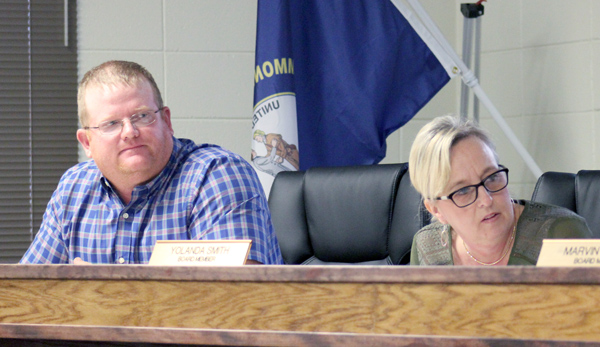Lincoln makes tentative cuts to teachers, instructional assistants
Published 2:00 pm Thursday, February 22, 2018

- Photo by Abigail Whitehouse School board members Alan Hubble, left, and Yolanda Smith listen to Lincoln County Superintendent Michael Rowe during a special-called meeting Tuesday.
STANFORD — Lincoln County Board of Education members approved tentative staffing cuts Tuesday that will eliminate 11 teachers and 12 instructional assistants if the state’s proposed budget cuts are approved.
Tentative staffing allocations are due March 1, but board members delayed the decision last week in an effort to search for alternative funding solutions to the potential $1.9 million loss in local educational funding.
During a special called meeting Tuesday, board members shared some additional areas where they believe savings could be found.
Trending
Superintendent Michael Rowe said after last week’s meeting he looked into cutting back bus purchases for potential savings.
“Usually that’s the first thing that they would recommend any time you’re in a budget crisis, is to cancel the bus purchases,” he said. “Unfortunately, we are under contract for our bus purchases and there is no penalty to pay to get out of it. Basically, we’re stuck paying for the buses, so that is not an option at this time.”
The superintendent also said he is looking into additional staffing cuts beyond Section 4 (allocations for certified staff) and Section 7 (distribution of the balance). According to the Kentucky Department of Education, “When allocations are made, the remaining funds are what is left over and Section 7 governs how the district distributes those funds.”
“We’re also working and looking at things we can do throughout the district above and beyond that,” he said.
Rowe said he’ll have a plan with actual numbers to share with the board during the March meeting.
“I’m looking above and beyond just the Section 4 and 7 because to get to a possible $1.9 million cut, we’re going to have to look at multiple areas,” he said.
Trending
Board members propose ideas
Theresa Long was the first board member to offer a list of potential savings that the district could continue to look into as the state budget is still being finalized.
“We’ve heard everybody’s voice. Our phones have rung off the hook. I don’t want to make any enemies here, but it’s inevitable that it’s going to happen,” she said. “I don’t want to close McKinney and I don’t want to cut a teacher. She (Debbie Francis) said exactly my thoughts; why don’t we start at the top?”
Long recommended cutting “any job that has been created in the last three years.”
“A lot of them have the same job description as some of the employees that’s already been here 10, 15, 20 years,” Long said. “It’s almost like we’re double dipping and it’s no one that’s in a classroom. It would be outside of a classroom. I have a few of those listed but I’ll leave that out for a while.”
The newspaper sent an open records request for the list mentioned, which was not shared during the meeting. A formal response had not been received as of press time, Wednesday.
The cost of district-paid cellphones has been a continuous debate, Long added.
“It’s not a great amount of money, but we’ve got to start somewhere so as each person’s contract ends on their cellphone, they’ll be on their own. That’s my recommendation,” she said.
Director of Finance Marsha Abel said during a previous board meeting that the cost of cellphones to the district, excluding those that are funded through areas other than the general fund, and after the “e-rate” has been applied, is about $1,000 a month or $12,000 a year.
Long also recommended cutting the expense of laundering uniforms.
“Then we talked about $35,000 going for laundering of uniforms,” she said. “Nobody else does it so I think that’s something that could be dissolved. Everybody that has a uniform, they can wash it themselves.”
Instead of ordering four buses a year, Long said maybe the district could order one less and possibly save $100,000.
“I am not for cutting any teachers whatsoever,” she said.
Long also said asked why the district sends school bus drivers to a “local person” for physicals when they “should be coming here.”
“That’s costing your district money,” she said. “When you all are doing that, you’re costing what’s going on right here, right now.”
Following Tuesday’s meeting, the newspaper requested records of emails discussing the district’s policy for bus driver’s medical examinations.
An email from Chief Academic Officer Jackie Risden-Smith to Transportation Director Don Leigh dated Jan. 10 states that a board member asked about driver’s physicals being done through the district’s contract with the Healthy Kids Clinic.
“We’ll let the board member know that this service by HKC needed some time for them to put into practice since coming to the district in August,” Risden-Smith wrote to Leigh.
On Jan. 31, a second email from Leigh to Risden-Smith states that Leigh met with HKC and a plan was constructed to perform the required driver physicals through HKC.
The district is spending hundreds of thousands of dollars on substitute teachers, as well, Long said.
Board member Marvin Wilson said the board catches a lot of heat that is caused by the state.
“We didn’t bring this $1.9 million around our neck,” Wilson said.”We’re trying to work through it and everybody thinks we have a magic wand; we don’t. But something’s going to have to be done.”
Wilson suggested putting a freeze on hiring and he and Long offered to give half of their board pay back to the district. Board members receive $75 per meeting so each would be donating $37.50 per meeting.
“If it winds up having to do the teachers, if that’s what it has to be, it has to be. But I don’t think we should take more than one out of each school. Each school can probably absorb losing one teacher, but you can’t go over here and take five out of the high school and take five out of the middle school without creating a lot of trouble,” Wilson said. “If we do wind up having to do that, then I think it can’t be more than one per school.”
Board member Alan Hubble said he agrees that career-pathway programs at the high school are very important — Lincoln County High School Principal Michael Godbey said earlier this month that cuts to teachers would translate to cuts to programs at LCHS such as agriculture, technology and foreign language.
“Myself, I didn’t go very far in school after high school, but a lot of what I learned in high school helped me in the field I’m in today. I think that’s very good for the youth of this county,” Hubble said.
Hubble said it seems like the burden always gets passed on to the landowners in the community.
A three-percent utility tax was mentioned by Tonya Foster, parent of a high school student, as a possible funding solution, but Hubble said the school district cannot levy a tax on utilities.
“If all of you got time, go home and call your legislators tonight. Say, ‘if you all do nothing else, allow our local school boards to put a tax on utilities, to levy the rate on utilities, because that would be the fairest tax we could pass for our community, because it affects everyone, not just the landowners,” Hubble said.
Instructional coaches were also discussed as potential positions that could be cut.
“I’m sure I’m going to catch a lot of slack over it, but the instructional coaches at the schools, I’m not saying they don’t have a very important job, but I see that as least-affecting the youth of this county in the classroom,” he said.
Hubble also suggested cutting cellphones and shortening the school year.
“We’re just required to have 1,081 hours. If we add 30 minutes to the school day, we’re saving about 15 days on the year. I’m not saying it’s a great idea. Y’all asked for ideas so we’re passing them out,” he said.
Rowe told board members he would look into all the suggestions made and try to produce a total amount of potential savings to share during the next regular meeting.
“Under House Bill 200, which is the governor’s budget and what funds that, 54 school districts will be broke next year, 108 the following year and almost all districts in the third year,” Rowe said. “Right now, Lincoln County is one of the 54 school districts who would be broke in their contingency fund by the end of June 30, 2019.”
It’s not a unique situation to Lincoln County, he said.
Rowe shared a list of quotes from local media in other school districts who are also discussing multiple cuts to positions to cover the budget next year.
“I’m recommending we have a tentative plan in place just in case the worst comes out. Then we hope and pray that Frankfort and our legislative folks working hard on our behalf are able to find extra money to bring back so we would not have to make cuts above and beyond that,” he said.
The board unanimously approved tentative staffing allocations that will eliminate 11.3 teacher positions – or 7.5 percent of the 150.8 full-time, general fund teachers. The cut will reduce the average student-to-teacher ratio from 25-to-1 to 28-to-1 in grades four through 12 and save an estimated $521,314.20.
“Again, we’re not anywhere in the neighborhood of $1.9 million that we’re going to have to cut,” Rowe said. “This will not be the only part that we’ll have to discuss but if we’re not going to discuss facilities or taxes at this time, this is one of many areas that we’ll have to look at.”
Rowe said historically, Lincoln County has hired positions above and beyond what the staffing formula states.
“Currently, we’re spending $395,000 above and beyond what the board has approved on positions,” he said. “That’s something else we have to address as we go through this but I wanted to put a dollar amount (on that) for the board.”
Director of Finance Marsha Abel said savings could be found in cuts to Section 7 staffing allocations, which are positions that are not required by state, such as assistant principals, counselors, attendance clerks, and instructional coaches.
“Our recommendation is to cut the additional instructional assistants that are above the requirements that we have to have for kindergarten,” Abel said.
The state does not require instructional assistants beyond the kindergarten classroom, Rowe added.
“That would be a savings of $210,000,” he said.
Board members voted to tentatively eliminate instructional assistant positions for any grade above kindergarten across the district, which is a total of 12 instructional assistant positions.
Final staffing allocations are subject to changes to the state budget, Rowe said, but school districts must submit their final staffing decisions to school councils by May 1.
Public Comments
Tuesday’s meeting drew another large crowd, with a handful of parents and teachers speaking before the board voted on the tentative cuts.
Connie Howerton, a Career and Technical Education teacher at LCHS, said of last year’s high school graduates, a total of 37.8 percent went directly into the workforce.
“It is part of our district’s mission statement and our school’s mission statement to help make our students career-ready. We offer 10 career pathways at Lincoln County High School. This year, we have 1,074 students enrolled in those,” she said. “When cutting positions, we will have to cut pathways. 37.8 percent of our kids go directly into the workforce. We have to prepare them for that.”
Gloria Sneed, a retired bus driver, encouraged the district to maintain the current bus purchase rotation.
“We had to buy so many because we hadn’t had any for such a long time. If you’ll buy two or three a year, you can keep up with it,” Sneed said.
Scott Maples, a Stanford resident, said as someone who has inspected facilities in over 22 school districts, the physical conditions of Lincoln County’s schools are among the worst he has seen.

Photo by Abigail Whitehouse
Stanford resident Scott Maples speaks on the condition of school buildings in Lincoln County during the public comments portion of the Board of Education’s Tuesday meeting.
“A lot of these elementary schools are riddled with asbestos. They have lots of structural issues. Is there any plan to correct those? It’s a serious concern of mine.” Maples said.
Debbie Francis said she is a teacher at LCMS, but she attended the board meeting to speak as a parent.
“I’m going to also ask you to please not do the band-aid approach. Please do long-term — whatever it is you decide, that’s fine, but make sure it’s going to last for the next several years,” she said.
Lincoln County Education Association President Kim Dillard said she works at both McKinney and Crab Orchard elementary schools and doesn’t believe closing McKinney – which was initially discussed but has since been tabled — would save teachers’ jobs.

Photo by Abigail Whitehouse
Kim Dillard, president of the Lincoln County Education Association, speaks during the special-called Board of Education meeting Tuesday night.
Dana Whitis, a parent of McKinney, LCMS and LCHS students, said every student in every classroom matters and the board should cut frivolous spending before cutting teachers.

Photo by Abigail Whitehouse
Dana Whitis, parent of three children enrolled at McKinney Elementary, Lincoln County Middle School and Lincoln County High School, speaks to board members about budget cuts during Tuesday’s meeting.
“These programs that are at the high school are wonderful. They’re great. My graduating class, there are so many people who have no jobs, are in-and-out of jail, why? because we didn’t have the opportunities that the high school students do now,” she said. “McKinney is not going to be a substantial amount in the bucket. But cutting our teachers, that’s hurting our kids.”
Susan Harris, a LCHS math teacher, said she was attacked for bringing statistics to the last meeting.
“First, if I own my own personal business and I’m going broke, I need to raise the price of my product. We’ve got to look at raising more money for our schools, period,” Harris said. “Secondly, I know the faculty and the staff, the teachers, the parents in McKinney feel like they’re being beat up on. The reality is, they’re the only school small enough right now for us to incorporate them into another building without losing their teachers. But just a solution, let’s vote right now to keep McKinney open for eternity, as long as we can take the cost of operating that building from their teachers.”
Harris said she feels like the high school is losing more teachers in order to maintain an outdated school building.
“We feel like we are losing more teachers, and we know we’re going to have to anyway — we’re going to have to lose teachers. But we feel like we’re losing more just for the upkeep of a building that we do not have to have,” she said.
SO YOU KNOW
To leave a message for your elected legislators, you may call the legislative message line, (800) 372-7181. The main phone line for Gov. Matt Bevin’s office is (502) 564-2611.





